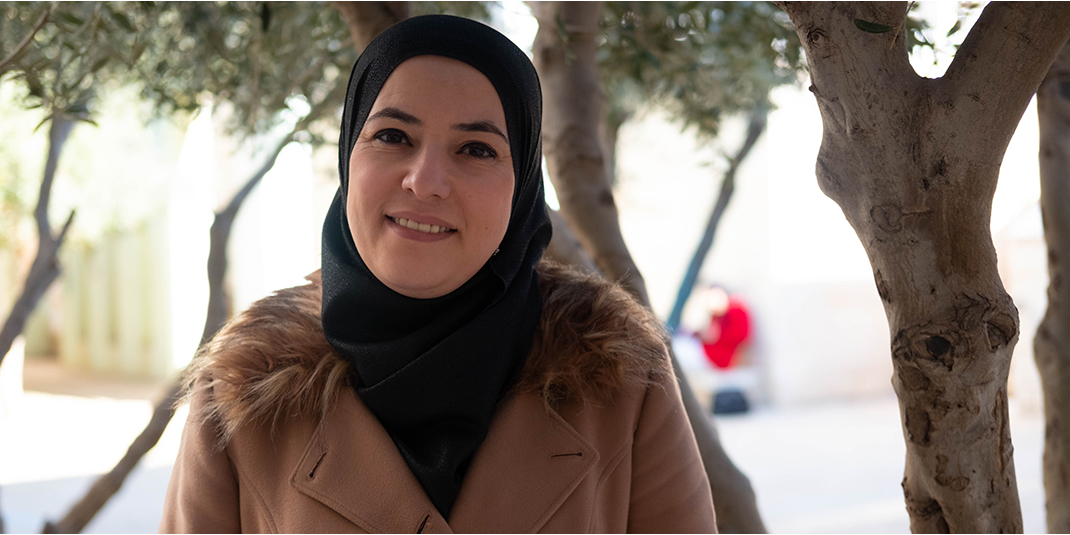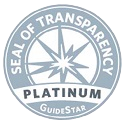Meet Angie

Meet Angie, the vice principal of our high school. Angie is a committed teacher and leader who has been a part of Hand in Hand for 18 years. She’s a mother and a visionary.
Introduce yourself, how long have you been at Hand in Hand and what is your role here?
Angie: My name is Angie, I’m the vice principal at Hand in Hand, in the high school. This is my 18th year at the school, which means that out of all the high school staff I’ve been here the longest. I’m a teacher for Arabic language and literature, and I teach Islam. Until now I’ve been teaching math as well. I’m a mother of two girls who both attend the school, one is in 9th grade and the other is in 3rd grade. And next year my son Hassan who is 3 will start in the preschool. That’s it, that’s basically what I do at the school. I guide and supervise the new teachers, I’m the Arabic language coordinator, I’m responsible for pedagogy in middle school.
Why have you chosen to stay at Hand in Hand all these years?
Angie: For me Hand in Hand is the normal place that I can live in, and every other place in my opinion is foreign and weird. I get here and I feel like I’ve left my home and arrived at my other home, like I have two homes. I feel like my life is here, especially since my daughters attend the school, so I feel like I breathe Hand in Hand’s language, this language of shared life/society, and I don’t think that I can live my life without this language. I cannot live in a world that is different from this one. I really value the school, and I value all the processes that we create and produce and push forward here. I know that we work hard in order to achieve the goals and vision that we built for ourselves, and we will continue working hard in order to apply all the values that we also really believe in. Also in my opinion it takes us a long time to know ourselves, because every time we meet new people who are different than us, we discover ourselves and a new part of ourselves. This means that our identity is bound up in the identity of the other. It is very dependent on the other. And every time we face another difference and another difference and another one, we discover another layer of our identity. And it’s a place of discovery, of self-discovery, a place of power, a place of building of identity, personality; it’s a place that can really lead to change in the crazy world that’s going on outside.
What are some of the most special moments here, both negative and positive?
Angie: Amongst the hardest moments for me at the school is Yom Hazikaron (Memorial Day). It’s a moment where we part, and everyone is just focused on themselves, on their own identity. And the difficulty is mainly that on the same day, because we have to be so practical, we speak about our identity in parallel, so we also talk about Nakba Day – even though Yom Hazikaron and Nakba Day are not on the same day, we do take advantage of this day, and for the students it is very difficult, because it’s not actually Nakba Day but we talk about Nakba Day on this day. We have to challenge ourselves to think about a different structure for this day, in my opinion. And one of the most exciting moments for me is the gathering that takes place afterwards, where we have a joint ceremony that people from outside our Hand in Hand community come to, and parents of alumni come, and parents of kids who left the school, and parents/people from outside come to this joint ceremony, which is like a WOW moment. That’s what makes us stronger – that moment of crisis when we separate from each other is a moment that really strengthens us. Because we feel suddenly like WOW we can’t live without the other. Also, amongst the most amazing and exciting moments for me at the school is when the art students present their artworks. These are moments of identity. They are moments of truth. We discover from their artwork that they’ve finally discovered themselves. They don’t think it’s their moment of truth, but it really is one of the most exciting moments in the school – the fact that they succeed in art without direction, without directing them to this subject, they actually come back to their identity, at the end of 12th grade. And we feel the power of the work regarding the subject of identity, from preschool to 12th grade.
What do you see in the students here that you may not see in other schools?
Angie: To tell you the truth, from the school, in the day to day, the kids don’t value all of these values that they live amongst here. They live their day to day, they run home after their exams, they have vibrant lives. But on the most important and intense days, we do feel like they’ve internalized these values. For instance, a week ago we presented in front of the parents of the sixth graders what we do in the middle and high school. And we brought students to present what we do. The kids did spoke about about values and about the quality of education here, and we just sat there so in awe from how they explained these things. They explained it from their hearts, what they really grasp and understand at the school. But the height of this happens when they finish 12th grade. Because when they finish 12th grade and go out into the world, we feel our work come to light, we put a check mark. Like wow… here! These are the kids of Hand in Hand. We see how they treat the other. Last year, for instance, I saw a girl that worked at Zara. And there were two gay men and a lesbian woman who worked there. I think that a Hand in Hand student was the first who was able to grasp them in their personality. Hand in Hand students are able to recognize the other and respect them just the way they are, and not discriminate. So you feel – their language, how they talk – with the people who come to buy, they speak in a different language. They know their limits, they know how to ask, they know how to say yes. They’re kids who know how to have a dialogue. So you see that they acquired these tools for dialogue with the other.
What do you hope for the future of Hand in Hand?
Angie: I hope that in a few years our students will really be agents of change, that they will be able to get to the job market. In the meantime, they’re students. Even some of the students from our first graduating class are still university students. I wish for them to start entering the job market, politics, and to all the professions that really influence this country and that they will be able to bring about change. I hope that in two years when we have our new building that we will really be able to do everything as it needs to be done, because right now we do many things in a strained manner because we are really short on space. So I wish for us to grow and advance.
What do you want people to know about Hand in Hand?
Angie: Many people from the outside know us but in a way that isn’t true. Even our curriculum – which they don’t know and don’t understand – they think that our goals are what they fantasize about. They don’t know our vision, they don’t know our goals. So I really want for us to circulate and publicize the accurate version of our school. Because I sometimes meet students and teachers from different places, and they think differently about us. So I really want them to know the real us and not what they think and guess about what happens here.









